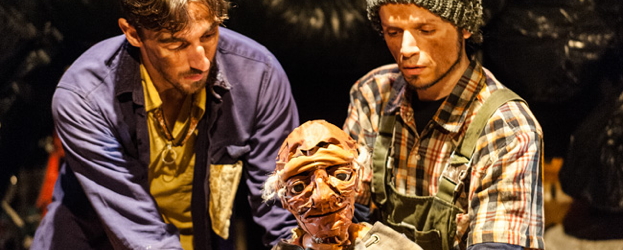This website uses cookies so that we can provide you with the best user experience possible. Cookie information is stored in your browser and performs functions such as recognising you when you return to our website and helping our team to understand which sections of the website you find most interesting and useful.
Caro Meets Children's Show Interview
Sue Buckmaster: Rubbish
By TW Editorial | Published on Thursday 17 April 2014

As a parent, I’m always on the lookout for great shows aimed at children and families. ‘Rubbish’ sounds like just the ticket, a piece that’s fun and brilliantly creative, yet also manages to convey some important messages about who we are and how we treat people.
As soon as I heard about the show, I was keen to find out more. So I sent some questions over to director Sue Buckmaster.
CM: Can you give us an idea of what happens in the show?
SB: We’ve created a world of rubbish; a mound of bin bags, inhabited by four Excavators. There’s a mix of gentle clowning, physical theatre and a lot of puppetry as the Excavators rummage through the rubbish. The audience will watch as a tale of discarded objects gradually emerges out of the bin bags. These bags hold many delights; out of each one a puppet appears assembled out of recycled or up-cycled objects. There’s a fabulous soundtrack and it’s a lot of fun!
CM: What’s the format? Is there a narrative thrust, or is it more a set of vignettes?
SB: There is a gentle narrative thread framing a series of vignettes; a series of bin-bag tales. Each tale is connected through the discovery of puppets created out of discarded objects; you’ll see a duck formed out of old-fashioned, no-longer used tea things and a cobbler formed out of the long-lost tools of his trade.
CM: Rubbish appears to be inspired by our ‘throw-away society’. Do you think it’s problematic that in these times things seem to be so easily discarded?
SB: Yes. In fact Rubbish was inspired as much by how we treat and discard or de-value others, as our throw-away society. Each bin-bag tale is a metaphor exploring, amongst other things, our attitude to old age, to being over-weight, to death and being alone. Rubbish is about perceiving objects in a new light and understanding that every object holds within it a rich history and imaginative new potential.
CM: Does Rubbish just offer the notion that discarded objects can become something new, or is there an element of helpful instruction in it?
SB: There is no direct instruction within the show, instead it is an opportunity to look at old objects and society’s attitude to others in a new way. Children are often more interested in the box a toy comes in, than the toy itself – they have no problem seeing the potential in objects beyond their original purpose. They know how to give them new meaning. We can learn from this.
CM: Theatre-Rites specifically focuses on theatrical productions for children. What attracted you to working in this medium?
SB: An audience of children and adults is one of the most thrilling audiences to reach. They enhance each other’s appreciation of the experience, if the show is made in a way that encourages them to do so. This has always interested me – that shared experience.
CM: How important is it, do you think, to expose young children to the experience of theatre?
SB: It’s important to recognise art’s key role in a child’s holistic development.
Making art for children is politically, socially and economically important. I am passionate about creating art experiences for children that are beautiful, elegant and of high quality, because it is through creating this truly imaginative, inquisitive and magical work, that children can really engage with the world.
CM: Do you think it’s harder to create good theatre for children than for adults?
SB: I think making good theatre is hard, no matter who your audience is. As a director I start by carefully selecting a team of highly skilled creators. Rubbish was devised by me, a set and costume designer, puppet designers, composer, sound engineer, a lighting designer, a stage manager and our team of performers. An audience of children will not politely pretend to be enjoying the show, so you know when you have succeeded. We should respect them as young, intelligent beings with a right to experience a breadth of excellent work in the same way any adult does, and with it, carve their own ideals, aspirations and politics.
CM: What’s next for the company?
SB: Most immediately, Rubbish will continue to tour throughout England until early June and then we will explore an international life for Rubbish. Our next show is somewhat of a departure for us – it’s called ‘Sue Buckmaster, The Puppet Whisperer’. We’re teaming up with The Little Angel Theatre to bring two evenings of live, unrehearsed, improvised puppetry this July. I’m trying this out first with a group of opera singers later this month as part of Singing Through Puppets Workshops.
Rubbish is on at Southbank Theatre until 21 April before embarking on a national tour. It returns to London in May for a a two night stint at The Albany in Deptford. See this page here for Southbank info and tickets and this page here for Albany info and tickets.
LINKS: www.theatre-rites.co.uk | www.southbankcentre.co.uk | www.thealbany.org.uk | twitter.com/TheatreRites






